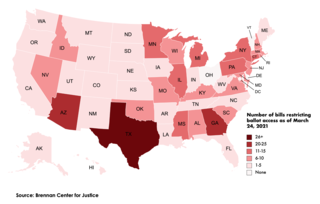Nathan Sproul is a Republican strategist [1] [2] [3] and political consultant for numerous election campaigns. Sproul is the managing director of Lincoln Strategy Group, an international political consulting firm based in Arizona. He is a former executive director of the Arizona Republican Party and the Arizona Christian Coalition.
He is a 1994 magna Cum Laude graduate of Pillsbury Baptist Bible College and has a Pastoral degree. [4]
Nathan and his wife Tiffani (née Smith) graduated from high school at Tri-City Christian Academy in Tempe, Arizona. They reside in Chandler, Arizona with their triplets.
Nathan started his career as an intern for the Republican National Committee. In 1997, Nathan went to work for the Arizona Christian Coalition.
He served as the executive director of the Arizona Republican Party from 1999 to 2002. [5]
Nathan started his own firm, Sproul & Associates in 2004. Also in 2004, he worked with the effort of removing the Arizona Clean Elections law formed in the spring by Representative Jeff Flake, an Arizona Republican. The ballot initiative would have essentially repealed Arizona's Clean Elections campaign finance system. Sproul was hired by No Taxpayer Money for Politicians to conduct a signature drive to get the anti-Clean Elections bill on the ballot. It failed its single subject challenge, with Attorney Lisa Hauser representing the inititiative. [6]
In 2004 Sproul & Associates was accused by several former employees and elections officials of cheating to boost GOP registration in key swing states. A former tryout of Sproul said, they as canvassers for example pretended to be nonpartisan political pollsters on their mission and selectively got Bush-supporters to register to vote. A few workers would try to register some Democrats anyway, but according to the claim that was against the will of the company. Another former employee also provided KLAS-TV with shredded registration forms of Democrats. [7] [8] Also during the 2004 election, it was alleged that Sproul's company had set up voter registration drives on their premises under the name "America Votes", a name already claimed by a large, progressive organization. [9] [10]
According to a 2005 Baltimore Chronicle article, the Republican Party had paid Nathan Sproul $8,359,161, and alleged this is far more than what had been reported to the FEC. [11]
In 2012 Sproul headed up a company called Strategic Allied Consulting which was hired by the Republican National Committee to conduct voter registration drives in preparation for the 2012 election. On September 27 the RNC announced it was cutting all ties with the company when over 100 suspicious Republican voter registrations from the company were submitted by the firm to Palm Beach County, Florida. [12] The RNC had also hired the company for similar work in Nevada, North Carolina, Colorado and Virginia. [12] Authorities in six Florida counties were investigating suspected registration fraud involving the firm. [13]
The Nation magazine, on September 26, 2012, described Sproul as "infamous for accusations that his firms have committed fraud by tampering with Democratic voter registration forms and suppressing votes." It noted that the Romney campaign, from November 2011 and ending in March 2012, had hired Sproul. It reported that following this, "there’s evidence that the payments continued, only to a different name," as only months thereafter, and months before the election, Strategic Allied Consulting was registered online and created as a business entity by Sproul. The Nation also reported that Sproul used a proxy that prevented others from seeing that his name as the registrant of the site, but that Greg Flynn of BlueNC had taken a screenshot of the Sproul registration of the site for Strategic Allied Consulting before his name was hidden from view. [14]
Furthermore, The Nation reported that Flynn had found that GOP committees in North Carolina, Florida and Colorado had given Sproul large payments, and that "the firm has been aggressively hiring in Nevada, North Carolina, Virginia and Florida." The Nation also found that the California Republican Party had given $430,840 in payments to "Grassroots Outreach, LLC" an organization which, based on the disclosure reported by The Nation, "shares the same address as Sproul's office in Tempe, Arizona." The Nation also found that "Craigslist job postings in California and Colorado use identical language as Strategic Allied Consulting's listings in North Carolina." [14]
After Florida prosecutors began investigating charges of voter fraud related to the company, the RNC said it was severing all ties to it. The RNC had spent $3.1 million with the company through the state committees in 2012. [15]
Voter caging is a colloquial term used in the United States referring to a campaign activity used to remove, or attempt to remove, targeted voters from official lists of registered voters. It occurs when a non-governmental organization, such as a political party or a campaign, sends first-class mail to registered voters, in order to compile a so-called "challenge list" of the names of those whose letters are returned undelivered. The fact that the mail was returned as undeliverable may be seen as either proof, or strong evidence of, the person no longer residing at the address on their voter registration. The challenge list is presented to election officials with the suggestion that the officials should purge these names from the voter registration rolls or to challenge voters' eligibility to vote on the grounds that the voters no longer reside at their registered addresses.

The Michigan Republican Party is the state affiliate of the national Republican Party in Michigan, United States, sometimes referred to as MIGOP.

The 2002 New Hampshire Senate election phone jamming scandal involved the use of a telemarketing firm hired by that state's Republican Party (NHGOP) for election tampering. The tampering involved using a call center to jam the phone lines of a get out the vote (GOTV) operation. In the end, 900 calls were made for 45 minutes of disruption to the Democratic-leaning call centers.
Christopher Joseph LaCivita is an American political consultant and former partner in FP1 Strategies, a national public affairs and campaign firm. He is known primarily for coordinating campaigns against military veterans running for higher office as members of the Democratic Party, including the controversial "Swift Boat Veterans for Truth" negative campaign against 2004 Democratic presidential nominee John F. Kerry and attacks on 2024 Democratic vice presidential nominee Governor Tim Walz. He most recently served as senior adviser to Donald Trump's successful 2024 presidential campaign.
Young Political Majors, LLC was a private consulting firm which registered people to vote as Republicans. It operated in several states including California, Florida, Arizona and Massachusetts. The firm was accused of misleading voters into registering as Republicans.

Voters of the Republican Party elected state delegations to the 2012 Republican National Convention in presidential primaries. The national convention then selected its nominee to run for President of the United States in the 2012 presidential election. There were 2,286 delegates chosen, and a candidate needed to accumulate 1,144 delegate votes at the convention to win the nomination. The caucuses allocated delegates to the respective state delegations to the national convention, but the actual election of the delegates were, many times, at a later date. Delegates were elected in different ways that vary from state to state. They could be elected at local conventions, selected from slates submitted by the candidates, selected at committee meetings, or elected directly at the caucuses and primaries.

James Bopp Jr. is an American conservative lawyer. He is most known for his work associated with election laws, anti-abortion model legislation, and campaign finance.

Karen Fann is a former Republican member of the Arizona Senate, representing Arizona Legislative District 1. Fann became President of the Arizona Senate in 2019, and served until 2023.

The 2012 Florida Republican presidential primary was held on January 31, 2012. Fifty delegates were at stake, none of them RNC delegates; it is unclear whether these delegates will be allocated proportionally or winner-take-all. Originally awarded 99 delegates, the Republican National Committee removed half of Florida's delegates because the state committee moved its Republican primary before March 6; the Republican National Committee rules also set the delegate allocation to be proportional because the contest was held before April 1. It is a closed primary. There were 4,063,853 registered Republican voters as of January 3, 2012.

The 2012 United States presidential election in Nevada took place on November 6, 2012, as part of the 2012 United States presidential election in which all 50 states plus the District of Columbia participated. State voters chose six electors to represent them in the Electoral College via a popular vote pitting incumbent Democratic President Barack Obama and his running mate, Vice President Joe Biden, against Republican challenger and former Massachusetts Governor Mitt Romney and his running mate, Congressman Paul Ryan.

Jennifer Mary Horn is an American politician. She was a two-time challenger for New Hampshire's 2nd congressional district. She won the Republican nomination in 2008 and became the first woman nominated by the Republican Party in the state. She lost to Paul Hodes in the general election. In 2010, she ran again and lost to Charles Bass in the Republican primary. She then served as chair of the New Hampshire Republican State Committee and co-founded The Lincoln Project.

The 2018 United States elections were held on Tuesday, November 6, 2018. These midterm elections occurred during Incumbent Republican President Donald Trump's first term. Although the Republican Party increased its majority in the Senate, unified Republican control of Congress and the White House was brought to an end when the Democratic Party won control of the House of Representatives in what was widely characterized as a "blue wave" election as Democrats also gained governorships, other statewide offices, and state legislative chambers.
Voter suppression in the United States consists of various legal and illegal efforts to prevent eligible citizens from exercising their right to vote. Such voter suppression efforts vary by state, local government, precinct, and election. Voter suppression has historically been used for racial, economic, gender, age and disability discrimination. After the American Civil War, all African-American men were granted voting rights, but poll taxes or language tests were used to limit and suppress the ability to register or cast a ballot. The Civil Rights Act of 1964 and the Voting Rights Act of 1965 improved voting access. Since the beginning of voter suppression efforts, proponents of these laws have cited concerns over electoral integrity as a justification for various restrictions and requirements, while opponents argue that these constitute bad faith given the lack of voter fraud evidence in the United States.

Ronna Romney McDaniel is an American political strategist who served as chair of the Republican National Committee (RNC) from 2017 until her resignation in 2024. A member of the Republican Party and the Romney family, McDaniel was chair of the Michigan Republican Party from 2015 to 2017.

Katherine Marie Walsh is an American Republican political operative who served as White House Deputy Chief of Staff for Implementation in the Donald Trump administration. She also worked with the Trump-aligned 501(c)(4) advocacy organization America First Policies.
Members of the United States Republican Party have reacted differently to Republican president Donald Trump's claims about the 2020 United States presidential election, with many publicly supporting them, many remaining silent, and a few publicly denouncing them. Trump claimed to have won the election, and made many claims of election fraud. By December 11, 2020, 126 out of 196 Republican members of the House backed a lawsuit filed in the United States Supreme Court supported by nineteen Republican state attorneys general seeking to subvert the election and overturn the election results. The Trump campaign hired the Berkeley Research Group to investigate whether there had been voter fraud. The researchers found nothing, and the consultancy reported this to Trump and his chief of staff Mark Meadows on a conference call in the final days of the year, before the attack on the Capitol.

Following the 2020 United States presidential election and the unsuccessful attempts by Donald Trump and various other Republican officials to overturn it, Republican lawmakers initiated a sweeping effort to make voting laws more restrictive within several states across the country. According to the Brennan Center for Justice, as of October 4, 2021, more than 425 bills that would restrict voting access have been introduced in 49 states—with 33 of these bills enacted across 19 states so far. The bills are largely centered around limiting mail-in voting, strengthening voter ID laws, shortening early voting, eliminating automatic and same-day voter registration, curbing the use of ballot drop boxes, and allowing for increased purging of voter rolls. Republicans in at least eight states have also introduced bills that would give lawmakers greater power over election administration after they were unsuccessful in their attempts to overturn election results in swing states won by Democratic candidate Joe Biden in the 2020 election. The efforts garnered press attention and public outrage from Democrats, and by 2023 Republicans had adopted a more "under the radar" approach to achieve their goals.

The 2021 Maricopa County presidential ballot audit, commonly referred to as the Arizona audit, was an examination of ballots cast in Maricopa County during the 2020 United States presidential election in Arizona initiated by Republicans in the Arizona State Senate and executed by private firms. Begun in April 2021, the audit stirred controversy due to extensive previous efforts by former president Donald Trump and his allies to overturn the election, and due to assertions of rule violations and irregularities in the conduct of the recount, leading to claims that the audit was essentially a disinformation campaign. In June 2021, Maggie Haberman of The New York Times and Charles Cooke of National Review reported that Trump had told associates that based on the results of the audit, he would be reinstated as president in August 2021.

Liz Harris is an American politician from Arizona and the Arizona RNC National Committeewoman. A Republican, she was a member of the Arizona House of Representatives from January 2023 to April 2023. Harris was elected in November 2022 from the 13th legislative district, which includes much of Chandler, Arizona.
Republican Party's efforts to disrupt the 2024 United States presidential election involve a series of coordinated actions intended to influence election outcomes at both federal and state levels. These efforts, which were preceded by Republican efforts to restrict voting following the 2020 presidential election, are characterized by legislative, legal, and administrative strategies that sought to affect voter access, election oversight, and post-election certification processes. This initiative grew out of widespread claims within certain Republican Party circles about election integrity, many of which trace back to the 2020 United States presidential election and Trump's false claims of a stolen election, including the election denial movement in the United States, despite a lack of substantial evidence supporting these allegations.